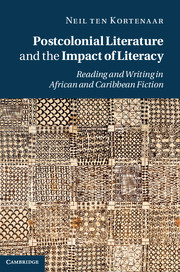 Postcolonial Literature and the Impact of Literacy
Postcolonial Literature and the Impact of Literacy Book contents
- Frontmatter
- Contents
- Acknowledgements
- 1 Introduction
- 2 The coming of literacy: Arrow of God by Chinua Achebe
- 3 The contents of the tin trunk: Ìsarà by Wole Soyinka
- 4 Mr Biswas finds a home in the world on paper: V. S. Naipaul
- 5 Literacy in the world not ruled by paper: Myal by Erna Brodber
- 6 Southern Africa's Houses of Hunger
- 7 Conclusion: the frontiers of writing
- Notes
- Bibliography
- Index
1 - Introduction
Published online by Cambridge University Press: 01 June 2011
- Frontmatter
- Contents
- Acknowledgements
- 1 Introduction
- 2 The coming of literacy: Arrow of God by Chinua Achebe
- 3 The contents of the tin trunk: Ìsarà by Wole Soyinka
- 4 Mr Biswas finds a home in the world on paper: V. S. Naipaul
- 5 Literacy in the world not ruled by paper: Myal by Erna Brodber
- 6 Southern Africa's Houses of Hunger
- 7 Conclusion: the frontiers of writing
- Notes
- Bibliography
- Index
Summary
In an almost archetypal scene in Chinua Achebe's 1964 novel Arrow of God, a mother and her three children gather in her house in her husband's compound after dinner. The novel is set in Southeastern Nigeria in 1922, when British colonization and Christian evangelization were first penetrating every level of Igbo society. Half in darkness, Ugoye tells two of her children a story. She and her listeners sit in a ‘close group near the cooking place’, enjoying a communion that complements the completed communal acts of preparing and eating food. Sitting apart from the others, beside the palm-oil taper that is the single source of light, is the eldest brother, Oduche, absorbed in his new school reader, the first book ever to enter the family's compound. He sits near ‘the entrance to the one sleeping-room’: reading, like sleeping and dreaming, opens a door to a separate, interior world that each person enters alone.
After negotiating with her listeners, Ugoye embarks upon a story about a man with two wives, one ‘wicked and envious’ and the other good and long-suffering (191). That story arises from and returns to the lived context of the teller and her listeners as Ugoye expresses her own feelings as the younger of two wives in a polygynous household. The children attend eagerly to a story they already know but have not heard ‘too often’ (190). The tale narrates the differing fates of two sons by two mothers who travel to the land of spirits.
- Type
- Chapter
- Information
- Postcolonial Literature and the Impact of LiteracyReading and Writing in African and Caribbean Fiction, pp. 1 - 21Publisher: Cambridge University PressPrint publication year: 2011


